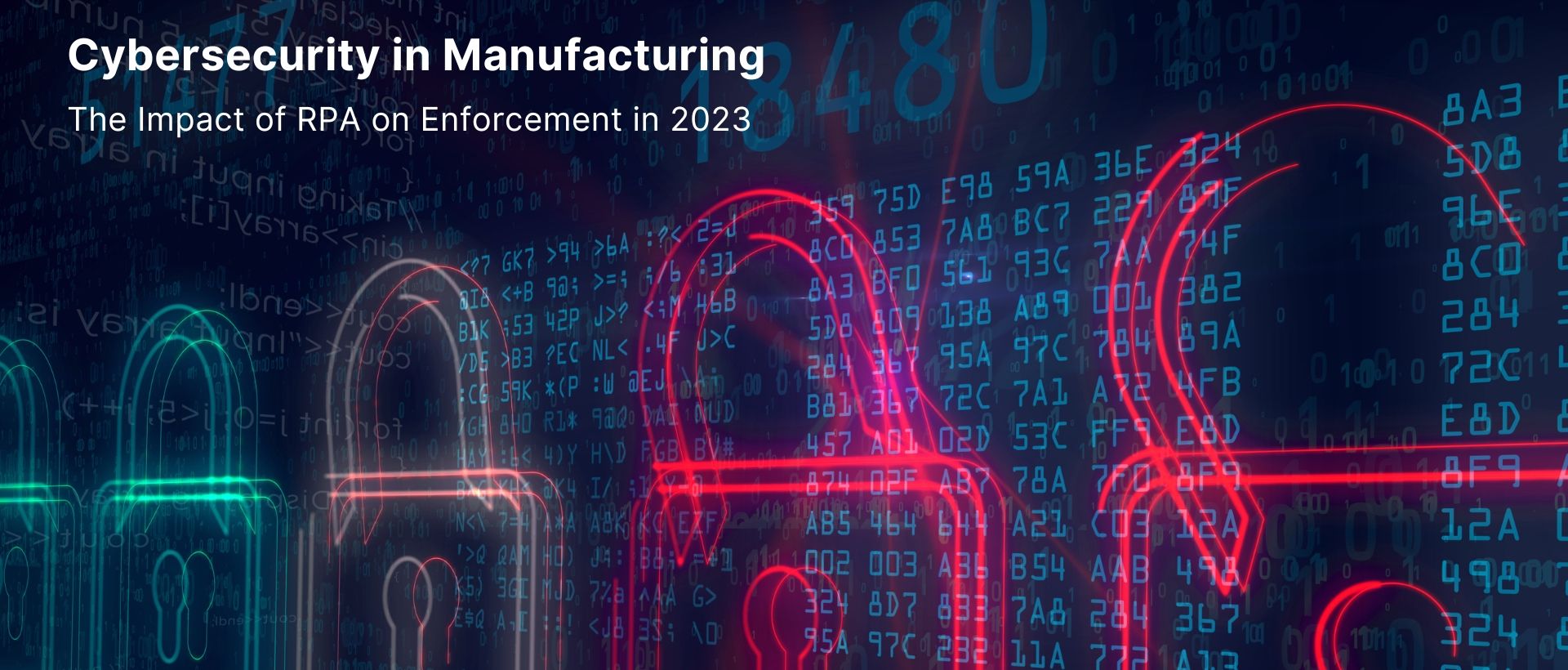
Cybersecurity in Manufacturing: The Impact of RPA on Enforcement in 2023
In today's rapidly evolving digital landscape, cybersecurity in the manufacturing industry has become a critical concern. The manufacturing industry is expected to reach a value of US$3.09tn by 2023, with a steady annual growth rate of 3.02%.

Ennuviz
Company
Table of content
However, this growth comes with increasing manufacturing cybersecurity challenges.
According to
These numbers are a bit scary and show how urgent it is for manufacturing companies to take cybersecurity seriously. They must protect their work, reputation, and everything they do.
This blog highlights the importance of cybersecurity in manufacturing and how Robotic Process Automation (RPA) can improve it. With RPA, manufacturers can reduce risks and fight against cyber threats.
Here are some ways how hackers take advantage of cybersecurity in manufacturing.
There are chances for some employees or contractors with authorized access to accidentally or purposely compromise security. As a result, this can lead to data breaches or disruptions in the system.
Manufacturing organizations can fall victim to phishing attacks. Hackers pretend to be someone trustworthy and send deceptive emails or messages. They try to trick employees into sharing sensitive information or giving them access.
Manufacturing companies are at risk of ransomware attacks. Hackers encrypt valuable data and demand money to unlock it. In case of non-recoveries, these attacks can disrupt operations and cause financial losses.
The manufacturing industry's interconnected supply chains create cybersecurity challenges. Weak security practices by suppliers or partners can be exploited, ultimately putting the whole process at risk. In 2021,
With the increasing
Manufacturing companies store vast amounts of sensitive data, making them targets for data breaches. Unapproved access to intellectual property, customer information, or proprietary designs can have severe consequences for the organization, including financial and reputational damage.
The manufacturing industry is also vulnerable to industrial espionage. Competitors or foreign entities may try to gain access to
- Trade secrets
- Proprietary designs
- Manufacturing processes
And other valuable intellectual property.
With cybercrime on the rise and manufacturers facing additional risks as they adopt and use new technologies, it's more important for senior executives to step up and lead the charge in developing and implementing an effective cybersecurity strategy.
The following are some of the most common challenges of cybersecurity in manufacturing.
A major challenge in manufacturing cybersecurity is that employees need more security knowledge. They might accidentally do the wrong things if they don’t know how to protect against threats which will ultimately put the company at risk. According to the Make UK report, only 26.8% of companies strongly believe they have the right tools and processes to deal with cyber incidents.
Manufacturers often need more money to invest in robust cybersecurity measures. Insufficient resources allocated to cybersecurity hinder the implementation of advanced security solutions. Ultimately, it leaves your systems vulnerable to attacks.
The increasing complexity and interconnectivity of manufacturing systems create cybersecurity challenges. It increases the attack surface and makes it difficult to ensure comprehensive security across the entire ecosystem.
The need for more skilled cybersecurity professionals in the manufacturing industry poses a significant challenge. The demand for experts who understand manufacturing operations and cybersecurity is high. It makes it challenging for organizations to recruit and retain qualified professionals.
The manufacturing sector is highly vulnerable to cyber-attacks. The extensive supply chain and the sheer volume of data generated by its operations make this sector an attractive target for hackers.
The consequences of breaches of cybersecurity in manufacturing can be devastating.
Let’s discuss some of them.
Cybersecurity breaches in manufacturing can lead to significant financial losses, including costs associated with incident response, system repairs, legal actions, and potential theft of intellectual property or sensitive data.
Breaches can disrupt operations, causing production delays and downtime. It can cause potential damage to critical infrastructure, which can result in reduced productivity, missed deadlines, and increased costs for remediation.
A cybersecurity breach can tarnish a company's reputation, eroding customer trust and loyalty. Loss of business opportunities and a damaged brand image are potential consequences of it.
Breaches undermine customer confidence in a manufacturer's ability to protect sensitive information. This can lead to customer churn, decreased sales, and reluctance to engage in future business transactions.
Dealing with the aftermath of a breach diverts resources and attention from core business activities. This results in productivity losses. Time spent on incident response, investigations, and system recovery impacts overall efficiency.
Breaches may lead to non-compliance with industry-specific regulations and data protection laws. This can result in penalties, fines, and legal consequences.
To tackle this cybersecurity for manufacturing challenges, leveraging RPA can play a pivotal role in enforcing robust security measures
RPA use is anticipated to rise considerably. According to a recent estimate from Gartner, Inc., global corporate spending on RPA software is
Here are key areas where RPA can enhance cybersecurity compliance and regulations in the manufacturing industry.
Using RPA technologies, systems can monitor, detect, and respond to potential cyber threats in real-time.
By automating and enhancing incident response processes, RPA can reduce downtime. It then minimizes potential damage from security incidents.
RPA can automate vulnerability scanning and assessment across the manufacturing environment. This enables timely patch management and strengthens overall security.
RPA automates compliance audits and streamlines the assessment of compliance with regulatory requirements. This includes automatically generated reports.
Using RPA, manufacturers can ensure uniform implementation and enforcement of security policies throughout their manufacturing ecosystem.
RPA technologies can expedite incident investigation processes by automating data collection, analysis, and correlation. It enables faster identifying the root cause and timely resolution of security incidents.
Robotic process automation can enforce the consistent application of security regulations. It automates security policy enforcement, access controls, and data protection measures across manufacturing systems and processes.
RPA also automates routine tasks and frees up resources. It allows experts to focus on more strategic aspects of cybersecurity.
While RPA can help manufacturers comply with regulations like GDPR, certain best practices should be followed when deploying the technology within your organization.
Thoroughly assess existing systems and processes. Identify areas for improvement and determine necessary measures for a successful RPA implementation.
Evaluate various RPA solutions and vendors based on their,
- Track record
- Security features
- Scalability
- Compatibility with manufacturing cybersecurity requirements.
Carefully design and optimize RPA processes to ensure they align with cybersecurity standards. Also, implement necessary controls and encryption mechanisms to safeguard sensitive manufacturing data.
Ensure that the chosen RPA solution seamlessly integrates with the existing security systems, establishing secure communication protocols and effectively sharing data while maintaining the integrity of manufacturing cybersecurity.
Implement robust monitoring and maintenance protocols to assess the performance and security of RPA processes continuously. Promptly address any vulnerabilities or issues and ensure a proactive approach to manufacturing cybersecurity.
Keeping manufacturing operations safe and secure is essential. That's why cybersecurity is so crucial in this industry. It helps protect important things like valuable assets and sensitive data and keeps everything running smoothly.
To make cybersecurity even stronger in manufacturing, it's a good idea to use RPA-based solutions. These solutions can find and stop threats, ensure data is sent securely, and respond quickly to any problems.
If you’re wondering about a reliable solution for cybersecurity in manufacturing, then
Connect us to drive operational excellence with digital transformation.
However, this growth comes with increasing manufacturing cybersecurity challenges.
According to
These numbers are a bit scary and show how urgent it is for manufacturing companies to take cybersecurity seriously. They must protect their work, reputation, and everything they do.
This blog highlights the importance of cybersecurity in manufacturing and how Robotic Process Automation (RPA) can improve it. With RPA, manufacturers can reduce risks and fight against cyber threats.
What Compromises the Cybersecurity in Manufacturing
Here are some ways how hackers take advantage of cybersecurity in manufacturing.
Insider Threats
There are chances for some employees or contractors with authorized access to accidentally or purposely compromise security. As a result, this can lead to data breaches or disruptions in the system.
Phishing Attacks
Manufacturing organizations can fall victim to phishing attacks. Hackers pretend to be someone trustworthy and send deceptive emails or messages. They try to trick employees into sharing sensitive information or giving them access.
Ransomware Attacks
Manufacturing companies are at risk of ransomware attacks. Hackers encrypt valuable data and demand money to unlock it. In case of non-recoveries, these attacks can disrupt operations and cause financial losses.
Supply Chain Vulnerabilities
The manufacturing industry's interconnected supply chains create cybersecurity challenges. Weak security practices by suppliers or partners can be exploited, ultimately putting the whole process at risk. In 2021,
IoT Device Exploitation
With the increasing
Data Breaches
Manufacturing companies store vast amounts of sensitive data, making them targets for data breaches. Unapproved access to intellectual property, customer information, or proprietary designs can have severe consequences for the organization, including financial and reputational damage.
Industrial Espionage
The manufacturing industry is also vulnerable to industrial espionage. Competitors or foreign entities may try to gain access to
- Trade secrets
- Proprietary designs
- Manufacturing processes
And other valuable intellectual property.
Let our experts guide you to transform your business towards success!
Navigating Manufacturing Cybersecurity Challenges
With cybercrime on the rise and manufacturers facing additional risks as they adopt and use new technologies, it's more important for senior executives to step up and lead the charge in developing and implementing an effective cybersecurity strategy.
The following are some of the most common challenges of cybersecurity in manufacturing.
Lack of Awareness and Understanding
A major challenge in manufacturing cybersecurity is that employees need more security knowledge. They might accidentally do the wrong things if they don’t know how to protect against threats which will ultimately put the company at risk. According to the Make UK report, only 26.8% of companies strongly believe they have the right tools and processes to deal with cyber incidents.
Budget Constraints and Resource Allocation
Manufacturers often need more money to invest in robust cybersecurity measures. Insufficient resources allocated to cybersecurity hinder the implementation of advanced security solutions. Ultimately, it leaves your systems vulnerable to attacks.
Complex and Interconnected Manufacturing Systems
The increasing complexity and interconnectivity of manufacturing systems create cybersecurity challenges. It increases the attack surface and makes it difficult to ensure comprehensive security across the entire ecosystem.
Shortage of Skilled Cybersecurity Professionals
The need for more skilled cybersecurity professionals in the manufacturing industry poses a significant challenge. The demand for experts who understand manufacturing operations and cybersecurity is high. It makes it challenging for organizations to recruit and retain qualified professionals.
Consequences of Lack of Cybersecurity in Manufacturing
The manufacturing sector is highly vulnerable to cyber-attacks. The extensive supply chain and the sheer volume of data generated by its operations make this sector an attractive target for hackers.
The consequences of breaches of cybersecurity in manufacturing can be devastating.
Let’s discuss some of them.
Financial Losses
Cybersecurity breaches in manufacturing can lead to significant financial losses, including costs associated with incident response, system repairs, legal actions, and potential theft of intellectual property or sensitive data.
Operational Disruptions
Breaches can disrupt operations, causing production delays and downtime. It can cause potential damage to critical infrastructure, which can result in reduced productivity, missed deadlines, and increased costs for remediation.
Reputational Damage
A cybersecurity breach can tarnish a company's reputation, eroding customer trust and loyalty. Loss of business opportunities and a damaged brand image are potential consequences of it.
Customer Trust Erosion
Breaches undermine customer confidence in a manufacturer's ability to protect sensitive information. This can lead to customer churn, decreased sales, and reluctance to engage in future business transactions.
Productivity Losses
Dealing with the aftermath of a breach diverts resources and attention from core business activities. This results in productivity losses. Time spent on incident response, investigations, and system recovery impacts overall efficiency.
Regulatory Non-Compliance
Breaches may lead to non-compliance with industry-specific regulations and data protection laws. This can result in penalties, fines, and legal consequences.
Fortifying Cybersecurity Compliance and Regulations:
The Role of RPA Enforcement
To tackle this cybersecurity for manufacturing challenges, leveraging RPA can play a pivotal role in enforcing robust security measures
RPA use is anticipated to rise considerably. According to a recent estimate from Gartner, Inc., global corporate spending on RPA software is
Here are key areas where RPA can enhance cybersecurity compliance and regulations in the manufacturing industry.
Enhanced Threat Detection and Response
Using RPA technologies, systems can monitor, detect, and respond to potential cyber threats in real-time.
Streamlined Security Incident Response
By automating and enhancing incident response processes, RPA can reduce downtime. It then minimizes potential damage from security incidents.
Proactive Vulnerability Monitoring
RPA can automate vulnerability scanning and assessment across the manufacturing environment. This enables timely patch management and strengthens overall security.
Automated Compliance Audits and Reporting
RPA automates compliance audits and streamlines the assessment of compliance with regulatory requirements. This includes automatically generated reports.
Improved Visibility and Control Over Security Policies
Using RPA, manufacturers can ensure uniform implementation and enforcement of security policies throughout their manufacturing ecosystem.
Accelerated Incident Investigation and Resolution
RPA technologies can expedite incident investigation processes by automating data collection, analysis, and correlation. It enables faster identifying the root cause and timely resolution of security incidents.
Consistent and Reliable Enforcement of Security Regulations
Robotic process automation can enforce the consistent application of security regulations. It automates security policy enforcement, access controls, and data protection measures across manufacturing systems and processes.
Augmented Scalability and Efficiency in Cybersecurity Compliance
RPA also automates routine tasks and frees up resources. It allows experts to focus on more strategic aspects of cybersecurity.
Best Practices for Implementing RPA in Manufacturing Cybersecurity
While RPA can help manufacturers comply with regulations like GDPR, certain best practices should be followed when deploying the technology within your organization.
Preparing for RPA Implementation
Thoroughly assess existing systems and processes. Identify areas for improvement and determine necessary measures for a successful RPA implementation.
Selecting the Right RPA Solution and Vendor
Evaluate various RPA solutions and vendors based on their,
- Track record
- Security features
- Scalability
- Compatibility with manufacturing cybersecurity requirements.
Designing and Optimizing RPA Processes for Cybersecurity
Carefully design and optimize RPA processes to ensure they align with cybersecurity standards. Also, implement necessary controls and encryption mechanisms to safeguard sensitive manufacturing data.
Ensuring Seamless Integration with Existing Security Systems
Ensure that the chosen RPA solution seamlessly integrates with the existing security systems, establishing secure communication protocols and effectively sharing data while maintaining the integrity of manufacturing cybersecurity.
Establishing Ongoing Monitoring and Maintenance Protocols
Implement robust monitoring and maintenance protocols to assess the performance and security of RPA processes continuously. Promptly address any vulnerabilities or issues and ensure a proactive approach to manufacturing cybersecurity.
Conclusion: Strengthening Cybersecurity in the US Manufacturing Industry with RPA
Keeping manufacturing operations safe and secure is essential. That's why cybersecurity is so crucial in this industry. It helps protect important things like valuable assets and sensitive data and keeps everything running smoothly.
To make cybersecurity even stronger in manufacturing, it's a good idea to use RPA-based solutions. These solutions can find and stop threats, ensure data is sent securely, and respond quickly to any problems.
If you’re wondering about a reliable solution for cybersecurity in manufacturing, then
Connect us to drive operational excellence with digital transformation.
Recommended Blogs

Let's get started today
Because we put you first. Our customer-obsessed working model honors client's needs.
Schedule DemoJoin our Newsletter. Stay Connected
Empowering Leaders to Transform the Future
Fuel your ambition with expert insights and strategies to drive your Business Transformation. For growth-minded leaders, this is where innovation meets opportunity. Stay bold and lead the curve!

 Ennuviz
Ennuviz


 Poornima Kumbaraj
Poornima Kumbaraj